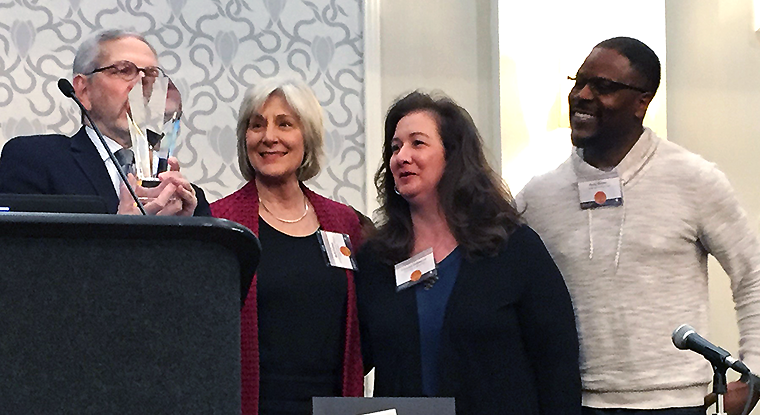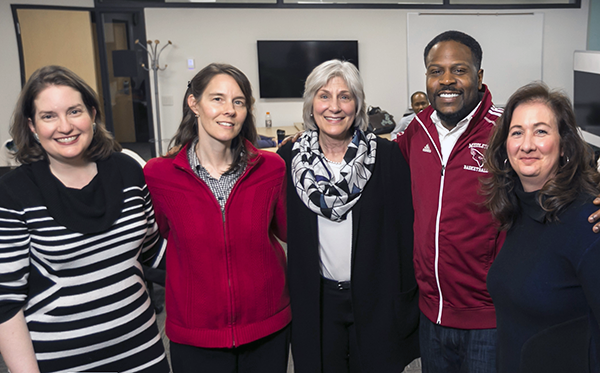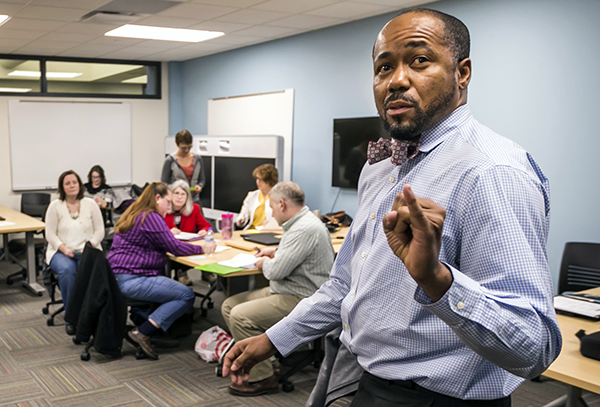‘Fair Play’ Video Game Honored With National Award for Revealing Bias in STEM Education
March 28, 2017 | By Lynn Armitage

Molly Carnes, Christine Pribbenow and Percy Brown, Jr. are honored with the 2017 Adolphus Toliver Award at the Understanding Interventions Conference in San Antonio, Texas.
Jimmy Cheffen was kicked out of graduate school for plagiarism. Not in real life, but as the avatar Jamal Davis in “Fair Play,” an interactive video game that teaches college and university educators how discrimination feels to underrepresented minorities pursuing STEM degrees.
“In the game, a white classmate asked to borrow Jamal’s homework. I’m a nice guy, so as Jamal, I let him and guess what? He stole my work!” recalls Cheffen, coordinator of faculty at Madison College. To add insult to injury, the fictional dean in the game accused Jamal of plagiarizing the other student’s paper, and told him that he should not have been in college in the first place. “Even though it was just a game, it really opened my eyes to unconscious bias and judgments that a dean or instructor might have toward minority students,” says Cheffen.
This experiential video game, funded by a $1.6 million four-year grant from the National Institutes of Health (NIH), is earning accolades for raising awareness about implicit bias in academic settings. Recently, the game’s founder, Dr. Molly Carnes, director of UW–Madison’s Center for Women’s Health Research, and Christine Pribbenow and Percy Brown, Jr. of the Wisconsin Center for Education Research, received the 2017 Adolphus Toliver Award for their collaborative work on “Fair Play.”

Kate McCleary and Kim Kile of the LEAD Center help facilitators Molly Carnes, Percy Brown, Jr. and Christine Pribbenow at the “Fair Play” workshop at Madison College.
The “Tol” Award is a team award given annually “in recognition of exemplary work in understanding interventions that broaden participation in science careers.” The award presentation took place at the Understanding Interventions (UI) Conference in San Antonio, Texas.
Pribbenow, director of WCER’s LEAD Center, says her colleagues were surprised when they were notified about winning the Tol Award. “We didn’t even know we were nominated! But we are thrilled and very honored,” she says. “Adolphus Toliver was a beloved scientist who developed a number of programs to increase the participation of underrepresented minorities in STEM, so to have this award in his honor is very meaningful.” During Toliver’s 37 years at NIH, he became known as a change agent and mentor who influenced an entire generation of biochemists. He later retired and passed away in 2013.
Daryl Chubin, co-chair of Understanding Interventions with Anthony DePass, says "Fair Play” was singled out for special recognition because Carnes’ team epitomizes the principles behind the award. “Not only has Molly mentored many people in her career, as Adolphus Toliver dedicated his life to doing. But the capstone reason we gave the ‘Fair Play’ team this award is that our organization bridges research to practice and we recognized that this game was an ingenious way to teach about bias, and hopefully reduce it.”
While progress has been made over the years in increasing the representation of women and minorities in STEM fields, the National Center for Science and Engineering Statistics reports that these demographic groups still “lag behind” the majority of STEM professionals. According to the UI website, 36 percent of African Americans and Latinos leave STEM doctoral programs before completion.

Jimmy Cheffen, a faculty coordinator at Madison College, engages with “Fair Play” workshop participants after they played the game.
To help improve upon those statistics, Carnes, Pribbenow and Brown were awarded another five-year NIH grant to conduct “Fair Play” workshops across the country, as they did recently at Madison College at the behest of Cheffen. After his own experience playing the game, the college administrator thought it would be a meaningful professional development tool for faculty and staff, and he was right.
“This game made us realize that unconscious bias in the classroom and on campus really exists. And it gave us terminology to use to speak to each other about ways to resolve it,” Cheffen sums up feedback from Madison College participants, and applauds the creation of real-life scenarios presented in the game. “To walk in the shoes of Jamal for a couple of hours was eye-opening, and our staff now believes that the most effective way to decrease unconscious bias is through perspective-taking.”
In “Fair Play,” Jamal experiences environmental and interpersonal biases during his first year of graduate school while finding an advisor, securing funding, establishing social networks, publishing papers and attending conferences. These scenarios are accurate portrayals of what happens in real life, says Pribbenow. “These simulations were created by content experts well-versed in gender and racial bias, and drawn from extensive research and literature that has documented bias for underrepresented minorities.” In fact, about 85 percent of workshop participants tell the “Fair Play” team that they empathized with Jamal.
For the remaining three years of the NIH workshop grant, the award-winning “Fair Play” team also plans to develop “Train the Trainer” workshops to teach academic organizations how to facilitate the game independently. “We hope to move into a more research-focused approach, to see if the concepts or knowledge that participants have learned in the game really stick, and to find out how they are using what they have learned to address unintentional bias on their own campuses,” says Pribbenow.
If anyone is interested in attending an upcoming workshop, or scheduling one with a facilitator, please call 608.263.4256 or 608.261.1139; or complete this online form.


